DNUR 415 Project: Peri-Operative Nursing Leadership & AD Patients
VerifiedAdded on 2022/11/03
|8
|2248
|300
Project
AI Summary
This project delves into nursing leadership strategies aimed at enhancing the peri-operative care and assessment of older adults with Alzheimer's Disease (AD). The paper begins with a literature review on the challenges and risks associated with surgical procedures in AD patients, including physiological and cognitive complications. It highlights the importance of pre-operative assessment, informed consent, and the potential for post-operative delirium. Best practice recommendations emphasize training for nurses in cognitive assessment, risk management, and pain/delirium management. Stakeholders, including nurse managers, nurses, and doctors, are identified, with resources like OCW, MOOCs, and assessment tools detailed. The expected outcomes include improved patient care, communication, and reduced complications. The implementation of change will be based on Kurt Lewin's Change Management Model, with transformational leadership. The project concludes with a call for enhanced training to improve patient outcomes and reduce the cost of care. The project emphasizes the need for training to help nurses assess patients' cognitive and critical thinking skills to enable them to make informed decisions.
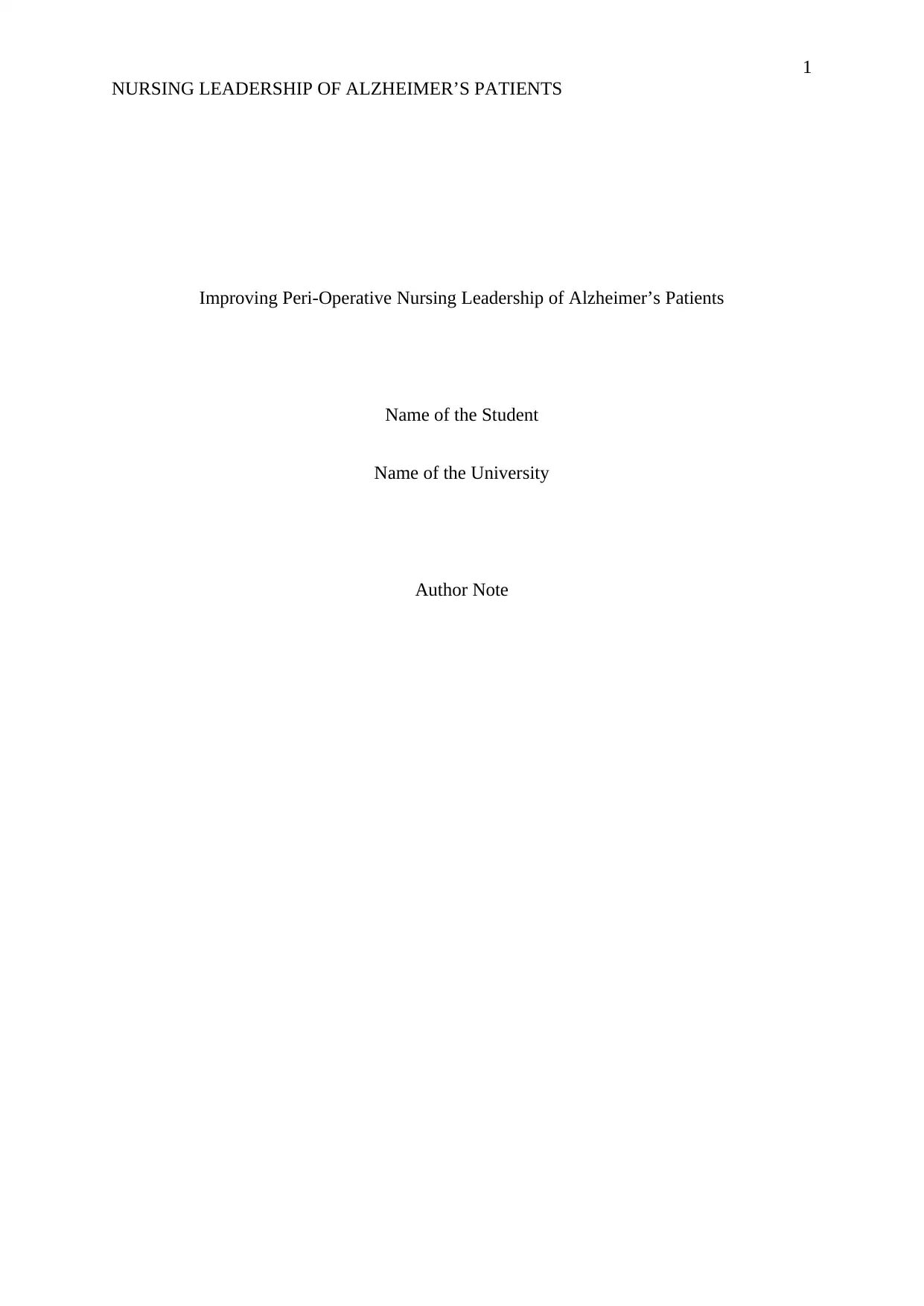
1
NURSING LEADERSHIP OF ALZHEIMER’S PATIENTS
Improving Peri-Operative Nursing Leadership of Alzheimer’s Patients
Name of the Student
Name of the University
Author Note
NURSING LEADERSHIP OF ALZHEIMER’S PATIENTS
Improving Peri-Operative Nursing Leadership of Alzheimer’s Patients
Name of the Student
Name of the University
Author Note
Paraphrase This Document
Need a fresh take? Get an instant paraphrase of this document with our AI Paraphraser
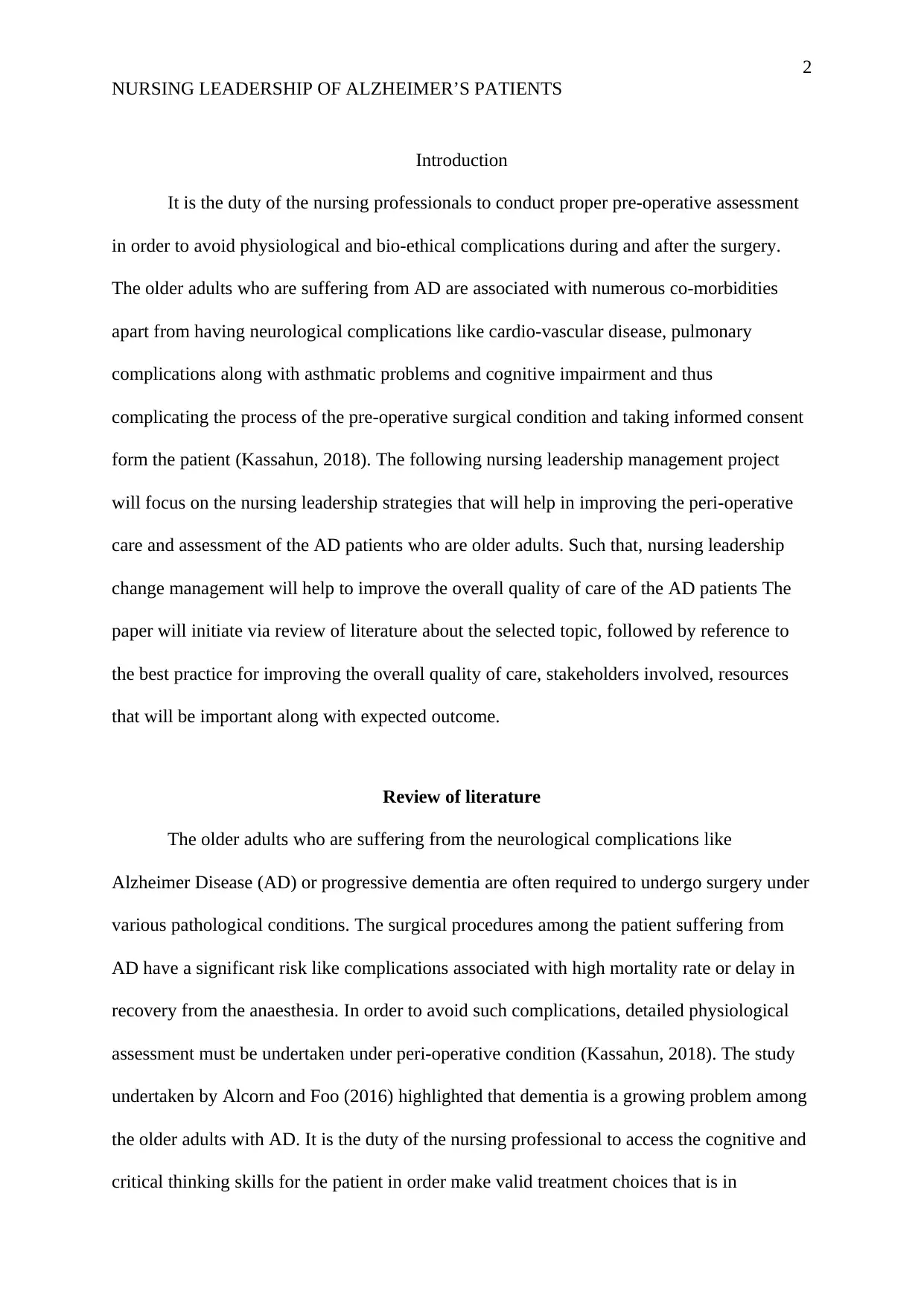
2
NURSING LEADERSHIP OF ALZHEIMER’S PATIENTS
Introduction
It is the duty of the nursing professionals to conduct proper pre-operative assessment
in order to avoid physiological and bio-ethical complications during and after the surgery.
The older adults who are suffering from AD are associated with numerous co-morbidities
apart from having neurological complications like cardio-vascular disease, pulmonary
complications along with asthmatic problems and cognitive impairment and thus
complicating the process of the pre-operative surgical condition and taking informed consent
form the patient (Kassahun, 2018). The following nursing leadership management project
will focus on the nursing leadership strategies that will help in improving the peri-operative
care and assessment of the AD patients who are older adults. Such that, nursing leadership
change management will help to improve the overall quality of care of the AD patients The
paper will initiate via review of literature about the selected topic, followed by reference to
the best practice for improving the overall quality of care, stakeholders involved, resources
that will be important along with expected outcome.
Review of literature
The older adults who are suffering from the neurological complications like
Alzheimer Disease (AD) or progressive dementia are often required to undergo surgery under
various pathological conditions. The surgical procedures among the patient suffering from
AD have a significant risk like complications associated with high mortality rate or delay in
recovery from the anaesthesia. In order to avoid such complications, detailed physiological
assessment must be undertaken under peri-operative condition (Kassahun, 2018). The study
undertaken by Alcorn and Foo (2016) highlighted that dementia is a growing problem among
the older adults with AD. It is the duty of the nursing professional to access the cognitive and
critical thinking skills for the patient in order make valid treatment choices that is in
NURSING LEADERSHIP OF ALZHEIMER’S PATIENTS
Introduction
It is the duty of the nursing professionals to conduct proper pre-operative assessment
in order to avoid physiological and bio-ethical complications during and after the surgery.
The older adults who are suffering from AD are associated with numerous co-morbidities
apart from having neurological complications like cardio-vascular disease, pulmonary
complications along with asthmatic problems and cognitive impairment and thus
complicating the process of the pre-operative surgical condition and taking informed consent
form the patient (Kassahun, 2018). The following nursing leadership management project
will focus on the nursing leadership strategies that will help in improving the peri-operative
care and assessment of the AD patients who are older adults. Such that, nursing leadership
change management will help to improve the overall quality of care of the AD patients The
paper will initiate via review of literature about the selected topic, followed by reference to
the best practice for improving the overall quality of care, stakeholders involved, resources
that will be important along with expected outcome.
Review of literature
The older adults who are suffering from the neurological complications like
Alzheimer Disease (AD) or progressive dementia are often required to undergo surgery under
various pathological conditions. The surgical procedures among the patient suffering from
AD have a significant risk like complications associated with high mortality rate or delay in
recovery from the anaesthesia. In order to avoid such complications, detailed physiological
assessment must be undertaken under peri-operative condition (Kassahun, 2018). The study
undertaken by Alcorn and Foo (2016) highlighted that dementia is a growing problem among
the older adults with AD. It is the duty of the nursing professional to access the cognitive and
critical thinking skills for the patient in order make valid treatment choices that is in
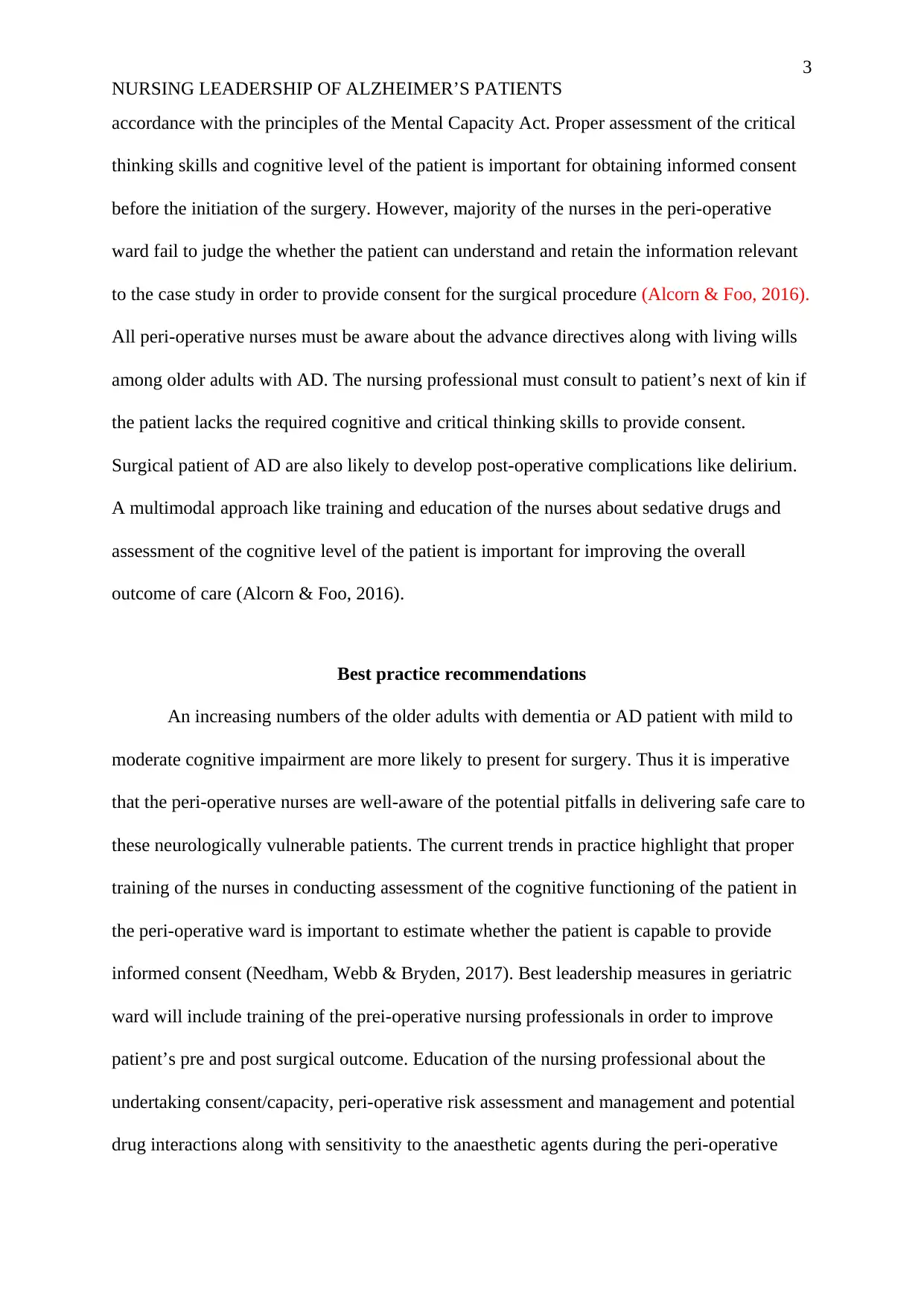
3
NURSING LEADERSHIP OF ALZHEIMER’S PATIENTS
accordance with the principles of the Mental Capacity Act. Proper assessment of the critical
thinking skills and cognitive level of the patient is important for obtaining informed consent
before the initiation of the surgery. However, majority of the nurses in the peri-operative
ward fail to judge the whether the patient can understand and retain the information relevant
to the case study in order to provide consent for the surgical procedure (Alcorn & Foo, 2016).
All peri-operative nurses must be aware about the advance directives along with living wills
among older adults with AD. The nursing professional must consult to patient’s next of kin if
the patient lacks the required cognitive and critical thinking skills to provide consent.
Surgical patient of AD are also likely to develop post-operative complications like delirium.
A multimodal approach like training and education of the nurses about sedative drugs and
assessment of the cognitive level of the patient is important for improving the overall
outcome of care (Alcorn & Foo, 2016).
Best practice recommendations
An increasing numbers of the older adults with dementia or AD patient with mild to
moderate cognitive impairment are more likely to present for surgery. Thus it is imperative
that the peri-operative nurses are well-aware of the potential pitfalls in delivering safe care to
these neurologically vulnerable patients. The current trends in practice highlight that proper
training of the nurses in conducting assessment of the cognitive functioning of the patient in
the peri-operative ward is important to estimate whether the patient is capable to provide
informed consent (Needham, Webb & Bryden, 2017). Best leadership measures in geriatric
ward will include training of the prei-operative nursing professionals in order to improve
patient’s pre and post surgical outcome. Education of the nursing professional about the
undertaking consent/capacity, peri-operative risk assessment and management and potential
drug interactions along with sensitivity to the anaesthetic agents during the peri-operative
NURSING LEADERSHIP OF ALZHEIMER’S PATIENTS
accordance with the principles of the Mental Capacity Act. Proper assessment of the critical
thinking skills and cognitive level of the patient is important for obtaining informed consent
before the initiation of the surgery. However, majority of the nurses in the peri-operative
ward fail to judge the whether the patient can understand and retain the information relevant
to the case study in order to provide consent for the surgical procedure (Alcorn & Foo, 2016).
All peri-operative nurses must be aware about the advance directives along with living wills
among older adults with AD. The nursing professional must consult to patient’s next of kin if
the patient lacks the required cognitive and critical thinking skills to provide consent.
Surgical patient of AD are also likely to develop post-operative complications like delirium.
A multimodal approach like training and education of the nurses about sedative drugs and
assessment of the cognitive level of the patient is important for improving the overall
outcome of care (Alcorn & Foo, 2016).
Best practice recommendations
An increasing numbers of the older adults with dementia or AD patient with mild to
moderate cognitive impairment are more likely to present for surgery. Thus it is imperative
that the peri-operative nurses are well-aware of the potential pitfalls in delivering safe care to
these neurologically vulnerable patients. The current trends in practice highlight that proper
training of the nurses in conducting assessment of the cognitive functioning of the patient in
the peri-operative ward is important to estimate whether the patient is capable to provide
informed consent (Needham, Webb & Bryden, 2017). Best leadership measures in geriatric
ward will include training of the prei-operative nursing professionals in order to improve
patient’s pre and post surgical outcome. Education of the nursing professional about the
undertaking consent/capacity, peri-operative risk assessment and management and potential
drug interactions along with sensitivity to the anaesthetic agents during the peri-operative
⊘ This is a preview!⊘
Do you want full access?
Subscribe today to unlock all pages.

Trusted by 1+ million students worldwide
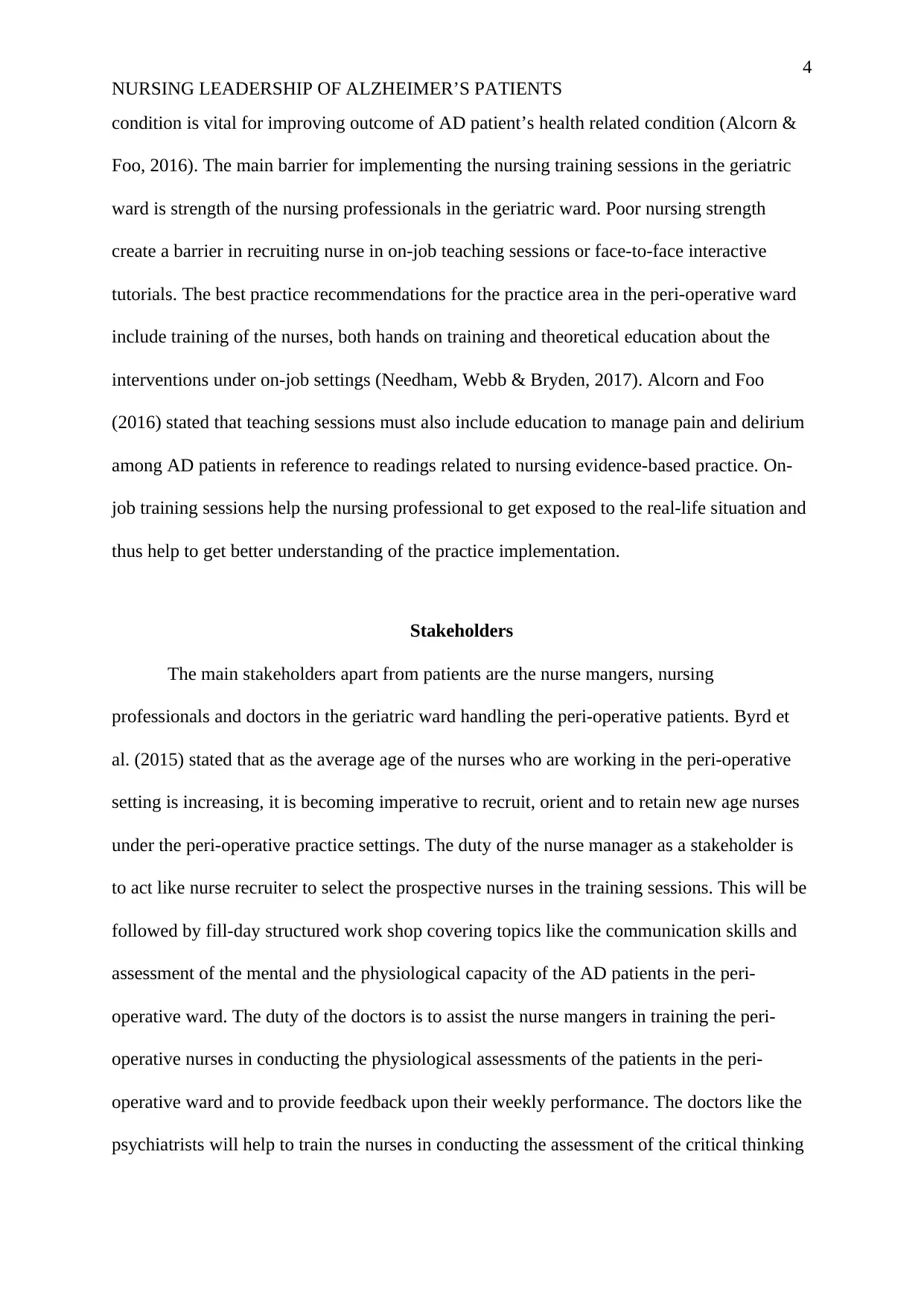
4
NURSING LEADERSHIP OF ALZHEIMER’S PATIENTS
condition is vital for improving outcome of AD patient’s health related condition (Alcorn &
Foo, 2016). The main barrier for implementing the nursing training sessions in the geriatric
ward is strength of the nursing professionals in the geriatric ward. Poor nursing strength
create a barrier in recruiting nurse in on-job teaching sessions or face-to-face interactive
tutorials. The best practice recommendations for the practice area in the peri-operative ward
include training of the nurses, both hands on training and theoretical education about the
interventions under on-job settings (Needham, Webb & Bryden, 2017). Alcorn and Foo
(2016) stated that teaching sessions must also include education to manage pain and delirium
among AD patients in reference to readings related to nursing evidence-based practice. On-
job training sessions help the nursing professional to get exposed to the real-life situation and
thus help to get better understanding of the practice implementation.
Stakeholders
The main stakeholders apart from patients are the nurse mangers, nursing
professionals and doctors in the geriatric ward handling the peri-operative patients. Byrd et
al. (2015) stated that as the average age of the nurses who are working in the peri-operative
setting is increasing, it is becoming imperative to recruit, orient and to retain new age nurses
under the peri-operative practice settings. The duty of the nurse manager as a stakeholder is
to act like nurse recruiter to select the prospective nurses in the training sessions. This will be
followed by fill-day structured work shop covering topics like the communication skills and
assessment of the mental and the physiological capacity of the AD patients in the peri-
operative ward. The duty of the doctors is to assist the nurse mangers in training the peri-
operative nurses in conducting the physiological assessments of the patients in the peri-
operative ward and to provide feedback upon their weekly performance. The doctors like the
psychiatrists will help to train the nurses in conducting the assessment of the critical thinking
NURSING LEADERSHIP OF ALZHEIMER’S PATIENTS
condition is vital for improving outcome of AD patient’s health related condition (Alcorn &
Foo, 2016). The main barrier for implementing the nursing training sessions in the geriatric
ward is strength of the nursing professionals in the geriatric ward. Poor nursing strength
create a barrier in recruiting nurse in on-job teaching sessions or face-to-face interactive
tutorials. The best practice recommendations for the practice area in the peri-operative ward
include training of the nurses, both hands on training and theoretical education about the
interventions under on-job settings (Needham, Webb & Bryden, 2017). Alcorn and Foo
(2016) stated that teaching sessions must also include education to manage pain and delirium
among AD patients in reference to readings related to nursing evidence-based practice. On-
job training sessions help the nursing professional to get exposed to the real-life situation and
thus help to get better understanding of the practice implementation.
Stakeholders
The main stakeholders apart from patients are the nurse mangers, nursing
professionals and doctors in the geriatric ward handling the peri-operative patients. Byrd et
al. (2015) stated that as the average age of the nurses who are working in the peri-operative
setting is increasing, it is becoming imperative to recruit, orient and to retain new age nurses
under the peri-operative practice settings. The duty of the nurse manager as a stakeholder is
to act like nurse recruiter to select the prospective nurses in the training sessions. This will be
followed by fill-day structured work shop covering topics like the communication skills and
assessment of the mental and the physiological capacity of the AD patients in the peri-
operative ward. The duty of the doctors is to assist the nurse mangers in training the peri-
operative nurses in conducting the physiological assessments of the patients in the peri-
operative ward and to provide feedback upon their weekly performance. The doctors like the
psychiatrists will help to train the nurses in conducting the assessment of the critical thinking
Paraphrase This Document
Need a fresh take? Get an instant paraphrase of this document with our AI Paraphraser
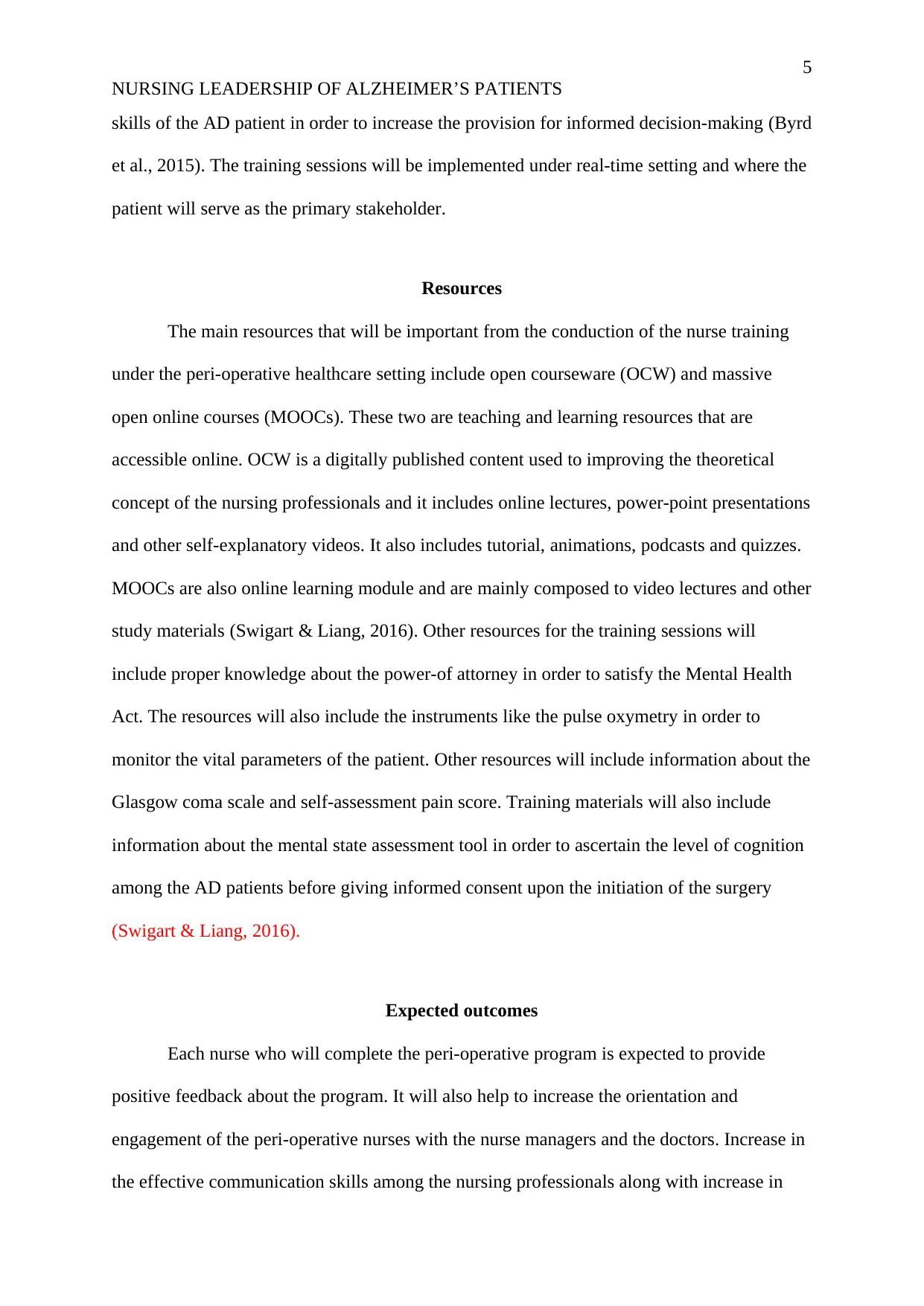
5
NURSING LEADERSHIP OF ALZHEIMER’S PATIENTS
skills of the AD patient in order to increase the provision for informed decision-making (Byrd
et al., 2015). The training sessions will be implemented under real-time setting and where the
patient will serve as the primary stakeholder.
Resources
The main resources that will be important from the conduction of the nurse training
under the peri-operative healthcare setting include open courseware (OCW) and massive
open online courses (MOOCs). These two are teaching and learning resources that are
accessible online. OCW is a digitally published content used to improving the theoretical
concept of the nursing professionals and it includes online lectures, power-point presentations
and other self-explanatory videos. It also includes tutorial, animations, podcasts and quizzes.
MOOCs are also online learning module and are mainly composed to video lectures and other
study materials (Swigart & Liang, 2016). Other resources for the training sessions will
include proper knowledge about the power-of attorney in order to satisfy the Mental Health
Act. The resources will also include the instruments like the pulse oxymetry in order to
monitor the vital parameters of the patient. Other resources will include information about the
Glasgow coma scale and self-assessment pain score. Training materials will also include
information about the mental state assessment tool in order to ascertain the level of cognition
among the AD patients before giving informed consent upon the initiation of the surgery
(Swigart & Liang, 2016).
Expected outcomes
Each nurse who will complete the peri-operative program is expected to provide
positive feedback about the program. It will also help to increase the orientation and
engagement of the peri-operative nurses with the nurse managers and the doctors. Increase in
the effective communication skills among the nursing professionals along with increase in
NURSING LEADERSHIP OF ALZHEIMER’S PATIENTS
skills of the AD patient in order to increase the provision for informed decision-making (Byrd
et al., 2015). The training sessions will be implemented under real-time setting and where the
patient will serve as the primary stakeholder.
Resources
The main resources that will be important from the conduction of the nurse training
under the peri-operative healthcare setting include open courseware (OCW) and massive
open online courses (MOOCs). These two are teaching and learning resources that are
accessible online. OCW is a digitally published content used to improving the theoretical
concept of the nursing professionals and it includes online lectures, power-point presentations
and other self-explanatory videos. It also includes tutorial, animations, podcasts and quizzes.
MOOCs are also online learning module and are mainly composed to video lectures and other
study materials (Swigart & Liang, 2016). Other resources for the training sessions will
include proper knowledge about the power-of attorney in order to satisfy the Mental Health
Act. The resources will also include the instruments like the pulse oxymetry in order to
monitor the vital parameters of the patient. Other resources will include information about the
Glasgow coma scale and self-assessment pain score. Training materials will also include
information about the mental state assessment tool in order to ascertain the level of cognition
among the AD patients before giving informed consent upon the initiation of the surgery
(Swigart & Liang, 2016).
Expected outcomes
Each nurse who will complete the peri-operative program is expected to provide
positive feedback about the program. It will also help to increase the orientation and
engagement of the peri-operative nurses with the nurse managers and the doctors. Increase in
the effective communication skills among the nursing professionals along with increase in
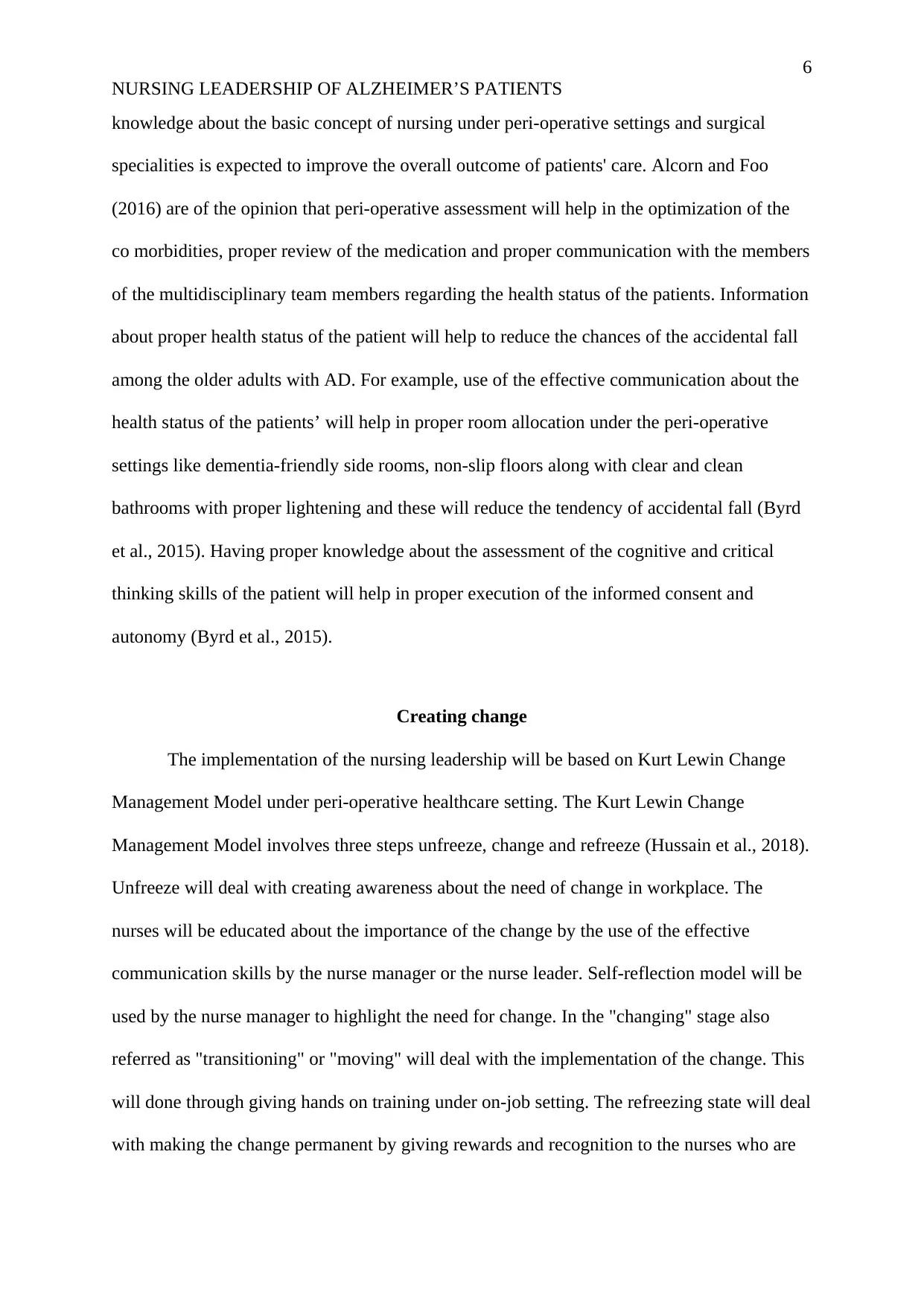
6
NURSING LEADERSHIP OF ALZHEIMER’S PATIENTS
knowledge about the basic concept of nursing under peri-operative settings and surgical
specialities is expected to improve the overall outcome of patients' care. Alcorn and Foo
(2016) are of the opinion that peri-operative assessment will help in the optimization of the
co morbidities, proper review of the medication and proper communication with the members
of the multidisciplinary team members regarding the health status of the patients. Information
about proper health status of the patient will help to reduce the chances of the accidental fall
among the older adults with AD. For example, use of the effective communication about the
health status of the patients’ will help in proper room allocation under the peri-operative
settings like dementia-friendly side rooms, non-slip floors along with clear and clean
bathrooms with proper lightening and these will reduce the tendency of accidental fall (Byrd
et al., 2015). Having proper knowledge about the assessment of the cognitive and critical
thinking skills of the patient will help in proper execution of the informed consent and
autonomy (Byrd et al., 2015).
Creating change
The implementation of the nursing leadership will be based on Kurt Lewin Change
Management Model under peri-operative healthcare setting. The Kurt Lewin Change
Management Model involves three steps unfreeze, change and refreeze (Hussain et al., 2018).
Unfreeze will deal with creating awareness about the need of change in workplace. The
nurses will be educated about the importance of the change by the use of the effective
communication skills by the nurse manager or the nurse leader. Self-reflection model will be
used by the nurse manager to highlight the need for change. In the "changing" stage also
referred as "transitioning" or "moving" will deal with the implementation of the change. This
will done through giving hands on training under on-job setting. The refreezing state will deal
with making the change permanent by giving rewards and recognition to the nurses who are
NURSING LEADERSHIP OF ALZHEIMER’S PATIENTS
knowledge about the basic concept of nursing under peri-operative settings and surgical
specialities is expected to improve the overall outcome of patients' care. Alcorn and Foo
(2016) are of the opinion that peri-operative assessment will help in the optimization of the
co morbidities, proper review of the medication and proper communication with the members
of the multidisciplinary team members regarding the health status of the patients. Information
about proper health status of the patient will help to reduce the chances of the accidental fall
among the older adults with AD. For example, use of the effective communication about the
health status of the patients’ will help in proper room allocation under the peri-operative
settings like dementia-friendly side rooms, non-slip floors along with clear and clean
bathrooms with proper lightening and these will reduce the tendency of accidental fall (Byrd
et al., 2015). Having proper knowledge about the assessment of the cognitive and critical
thinking skills of the patient will help in proper execution of the informed consent and
autonomy (Byrd et al., 2015).
Creating change
The implementation of the nursing leadership will be based on Kurt Lewin Change
Management Model under peri-operative healthcare setting. The Kurt Lewin Change
Management Model involves three steps unfreeze, change and refreeze (Hussain et al., 2018).
Unfreeze will deal with creating awareness about the need of change in workplace. The
nurses will be educated about the importance of the change by the use of the effective
communication skills by the nurse manager or the nurse leader. Self-reflection model will be
used by the nurse manager to highlight the need for change. In the "changing" stage also
referred as "transitioning" or "moving" will deal with the implementation of the change. This
will done through giving hands on training under on-job setting. The refreezing state will deal
with making the change permanent by giving rewards and recognition to the nurses who are
⊘ This is a preview!⊘
Do you want full access?
Subscribe today to unlock all pages.

Trusted by 1+ million students worldwide
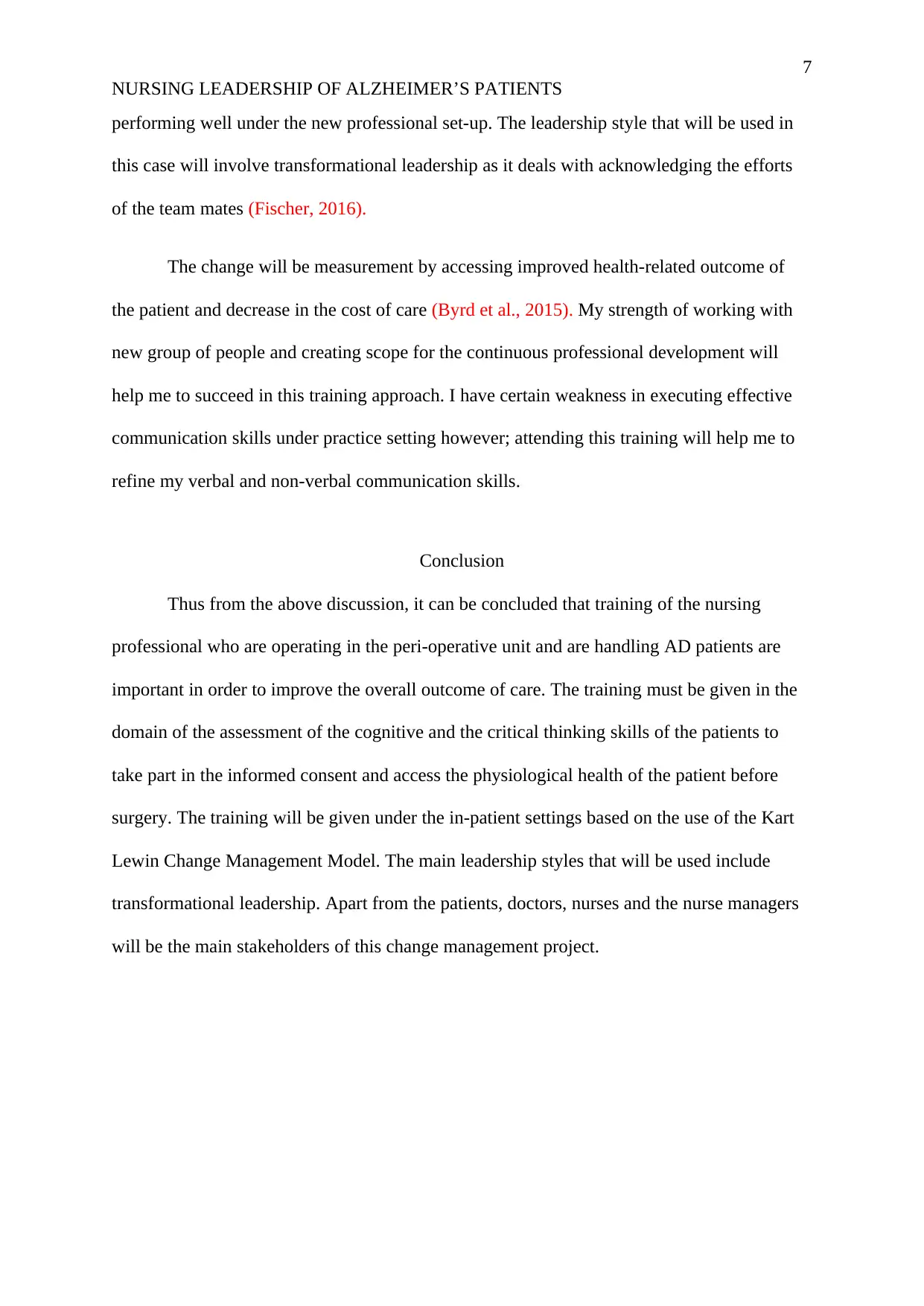
7
NURSING LEADERSHIP OF ALZHEIMER’S PATIENTS
performing well under the new professional set-up. The leadership style that will be used in
this case will involve transformational leadership as it deals with acknowledging the efforts
of the team mates (Fischer, 2016).
The change will be measurement by accessing improved health-related outcome of
the patient and decrease in the cost of care (Byrd et al., 2015). My strength of working with
new group of people and creating scope for the continuous professional development will
help me to succeed in this training approach. I have certain weakness in executing effective
communication skills under practice setting however; attending this training will help me to
refine my verbal and non-verbal communication skills.
Conclusion
Thus from the above discussion, it can be concluded that training of the nursing
professional who are operating in the peri-operative unit and are handling AD patients are
important in order to improve the overall outcome of care. The training must be given in the
domain of the assessment of the cognitive and the critical thinking skills of the patients to
take part in the informed consent and access the physiological health of the patient before
surgery. The training will be given under the in-patient settings based on the use of the Kart
Lewin Change Management Model. The main leadership styles that will be used include
transformational leadership. Apart from the patients, doctors, nurses and the nurse managers
will be the main stakeholders of this change management project.
NURSING LEADERSHIP OF ALZHEIMER’S PATIENTS
performing well under the new professional set-up. The leadership style that will be used in
this case will involve transformational leadership as it deals with acknowledging the efforts
of the team mates (Fischer, 2016).
The change will be measurement by accessing improved health-related outcome of
the patient and decrease in the cost of care (Byrd et al., 2015). My strength of working with
new group of people and creating scope for the continuous professional development will
help me to succeed in this training approach. I have certain weakness in executing effective
communication skills under practice setting however; attending this training will help me to
refine my verbal and non-verbal communication skills.
Conclusion
Thus from the above discussion, it can be concluded that training of the nursing
professional who are operating in the peri-operative unit and are handling AD patients are
important in order to improve the overall outcome of care. The training must be given in the
domain of the assessment of the cognitive and the critical thinking skills of the patients to
take part in the informed consent and access the physiological health of the patient before
surgery. The training will be given under the in-patient settings based on the use of the Kart
Lewin Change Management Model. The main leadership styles that will be used include
transformational leadership. Apart from the patients, doctors, nurses and the nurse managers
will be the main stakeholders of this change management project.
Paraphrase This Document
Need a fresh take? Get an instant paraphrase of this document with our AI Paraphraser
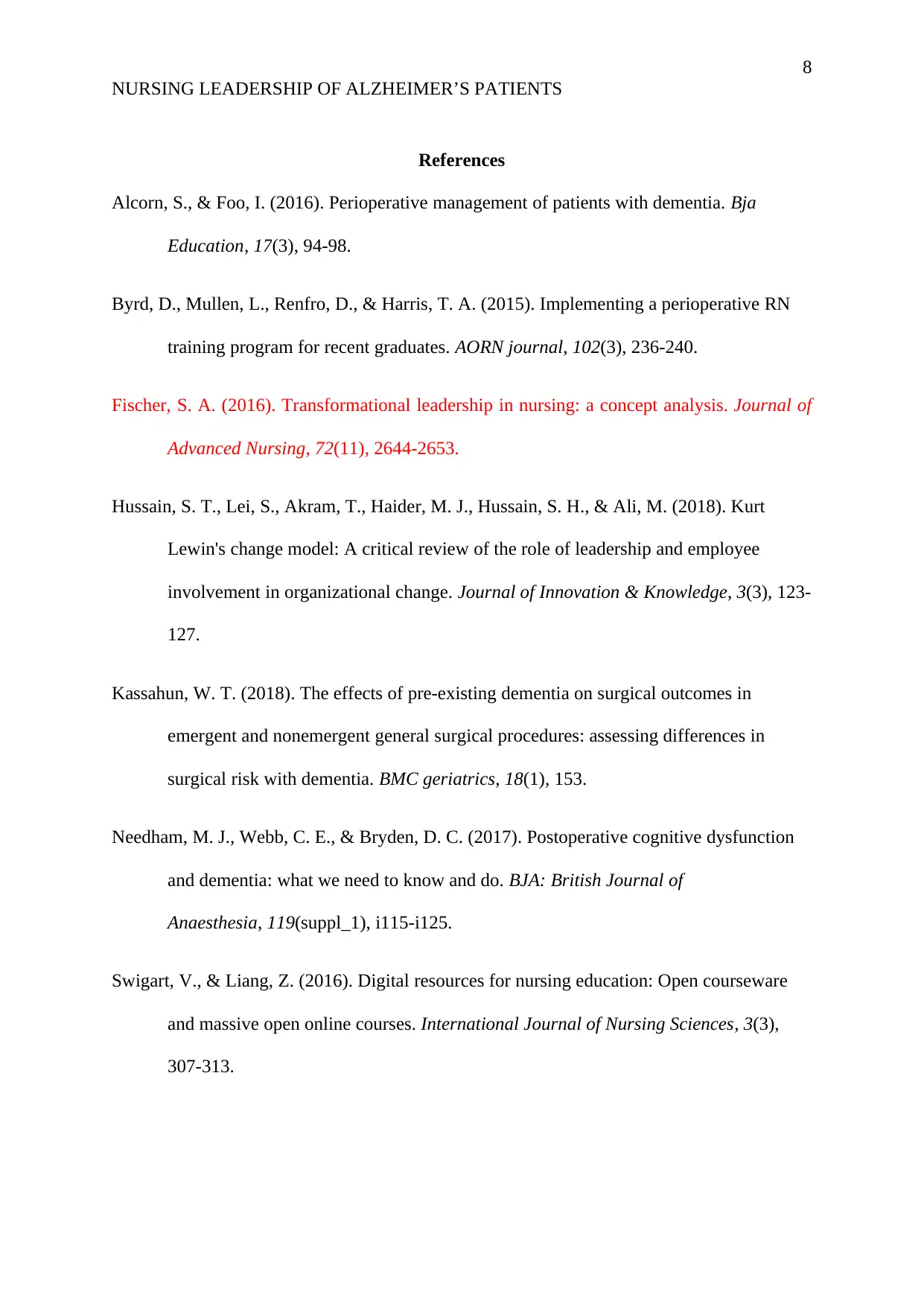
8
NURSING LEADERSHIP OF ALZHEIMER’S PATIENTS
References
Alcorn, S., & Foo, I. (2016). Perioperative management of patients with dementia. Bja
Education, 17(3), 94-98.
Byrd, D., Mullen, L., Renfro, D., & Harris, T. A. (2015). Implementing a perioperative RN
training program for recent graduates. AORN journal, 102(3), 236-240.
Fischer, S. A. (2016). Transformational leadership in nursing: a concept analysis. Journal of
Advanced Nursing, 72(11), 2644-2653.
Hussain, S. T., Lei, S., Akram, T., Haider, M. J., Hussain, S. H., & Ali, M. (2018). Kurt
Lewin's change model: A critical review of the role of leadership and employee
involvement in organizational change. Journal of Innovation & Knowledge, 3(3), 123-
127.
Kassahun, W. T. (2018). The effects of pre-existing dementia on surgical outcomes in
emergent and nonemergent general surgical procedures: assessing differences in
surgical risk with dementia. BMC geriatrics, 18(1), 153.
Needham, M. J., Webb, C. E., & Bryden, D. C. (2017). Postoperative cognitive dysfunction
and dementia: what we need to know and do. BJA: British Journal of
Anaesthesia, 119(suppl_1), i115-i125.
Swigart, V., & Liang, Z. (2016). Digital resources for nursing education: Open courseware
and massive open online courses. International Journal of Nursing Sciences, 3(3),
307-313.
NURSING LEADERSHIP OF ALZHEIMER’S PATIENTS
References
Alcorn, S., & Foo, I. (2016). Perioperative management of patients with dementia. Bja
Education, 17(3), 94-98.
Byrd, D., Mullen, L., Renfro, D., & Harris, T. A. (2015). Implementing a perioperative RN
training program for recent graduates. AORN journal, 102(3), 236-240.
Fischer, S. A. (2016). Transformational leadership in nursing: a concept analysis. Journal of
Advanced Nursing, 72(11), 2644-2653.
Hussain, S. T., Lei, S., Akram, T., Haider, M. J., Hussain, S. H., & Ali, M. (2018). Kurt
Lewin's change model: A critical review of the role of leadership and employee
involvement in organizational change. Journal of Innovation & Knowledge, 3(3), 123-
127.
Kassahun, W. T. (2018). The effects of pre-existing dementia on surgical outcomes in
emergent and nonemergent general surgical procedures: assessing differences in
surgical risk with dementia. BMC geriatrics, 18(1), 153.
Needham, M. J., Webb, C. E., & Bryden, D. C. (2017). Postoperative cognitive dysfunction
and dementia: what we need to know and do. BJA: British Journal of
Anaesthesia, 119(suppl_1), i115-i125.
Swigart, V., & Liang, Z. (2016). Digital resources for nursing education: Open courseware
and massive open online courses. International Journal of Nursing Sciences, 3(3),
307-313.
1 out of 8
Related Documents
Your All-in-One AI-Powered Toolkit for Academic Success.
+13062052269
info@desklib.com
Available 24*7 on WhatsApp / Email
![[object Object]](/_next/static/media/star-bottom.7253800d.svg)
Unlock your academic potential
Copyright © 2020–2026 A2Z Services. All Rights Reserved. Developed and managed by ZUCOL.





